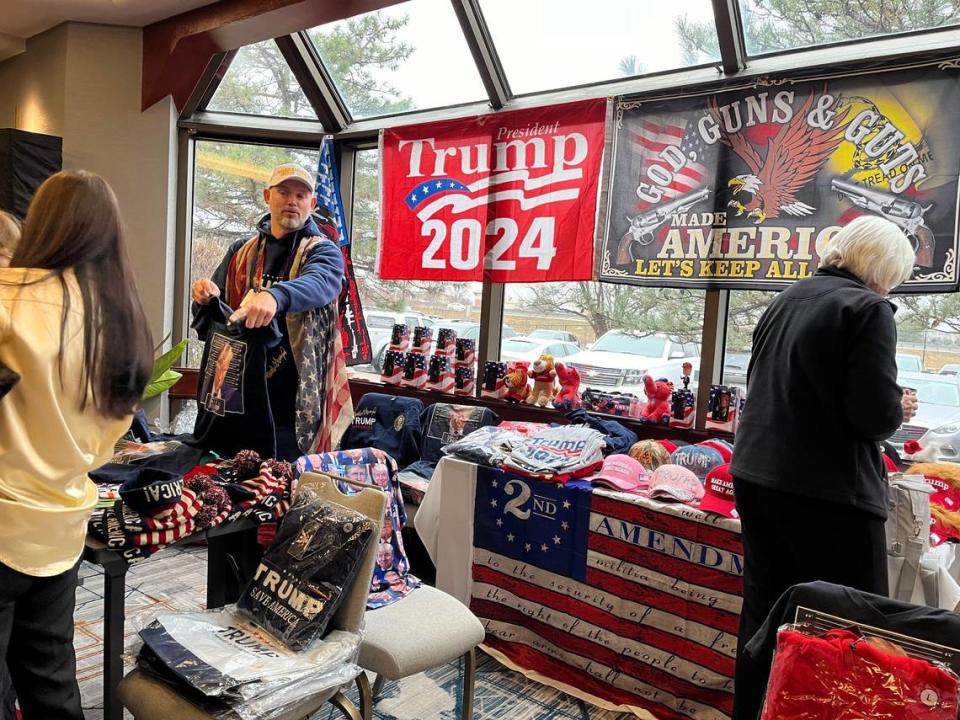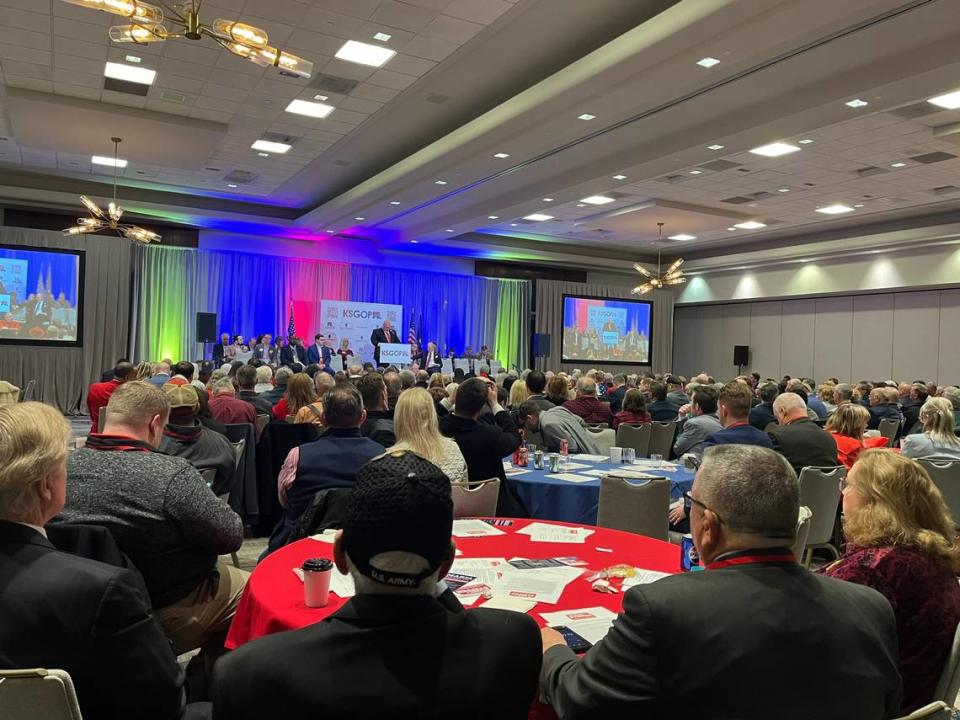The Koch network picked Nikki Haley. Has it paid off in Kansas, the Koch’s home base?
- Oops!Something went wrong.Please try again later.
- Oops!Something went wrong.Please try again later.
At the Kansas Republican Party’s annual convention in Overland Park on Saturday, Nikki Haley’s presidential campaign was nowhere to be found.
Party activists proudly sported Make America Great Again hats and the Trump Store hosted a large booth selling sweatshirts, teddy bears and socks bearing former President Donald Trump’s name.
It was as if Trump had already secured the nomination – not even a single Haley button or sign could be spotted.
At the state committee meeting, party chairman Mike Brown announced the leaders of Trump’s campaign in Kansas – Brown’s wife Kristi Brown and former Gov. Jeff Colyer. Haley, a former South Carolina governor and United Nations ambassador, was mentioned just once, in reference to a straw poll of party members showing Trump with a strong lead over Haley.
“We are getting very, very, close to calling it,” Brown told the state committee. “It’s time to move on with a nominee and get busy beating Joe Biden.”
Since November, Haley has enjoyed the support of Americans for Prosperity Action, the organization that serves as a political arm of the Kansas-based Koch family. AFP promised significant cash and on-the-ground support for her campaign.
While the operation may have helped Haley, she’s failing to generate the critical mass of voter support needed to overtake Trump, even in Kansas, the home state of Charles Koch, the co-owner and CEO of Wichita-based Koch Industries.
The Koch name has long played a major role in Republican politics, both in Kansas and nationally, spending millions to promote an ideology focused on small government and few business regulations.
But that influence doesn’t always extend to the everyday Republican voter.
“Anybody that establishment doesn’t want is who I want,” Angel Cushing, a Lyon County resident who attended the Kansas GOP convention, said in explaining her support for Trump. She included the Kochs in her definition of establishment.
Kansas doesn’t hold its Republican primary until March 19, two weeks after Super Tuesday, when 15 states and one territory hold primaries to determine their nominees for president. By then the field of candidates has narrowed, which means it doesn’t get the same focus as states like Iowa, New Hampshire and Haley’s home state of South Carolina.
Haley came in third place in the Iowa caucus, second in New Hampshire and is the last serious candidate standing between Trump and the nomination. But it’s not clear that Haley’s campaign will have enough steam to last to the Kansas primary.
“I think we all wish we could have had it earlier,” House Speaker Dan Hawkins, a Wichita Republican, said of the Kansas primary. Hawkins said Kansans were excited about Trump.
Haley, he said, will “get some votes. Will she win it? No.”

From Cruz to Trump to ... Trump?
Haley’s struggle for support in Kansas – the home base of her biggest benefactor – helps explain why her campaign may fade before the state even votes.
Kansas Republican voters backed Sen. Ted Cruz of Texas in the 2016 presidential caucus by 15 percentage points amid a national primary battle where Trump was slowly marching to the nomination as a political outsider threatening to break up the status quo.
But since winning the primary in 2016, Trump has effectively become the Republican Party. His most loyal Kansas supporters have now taken leadership roles in the state party.
His supporters have also been galvanized by the criminal charges brought against the former president over hush money payments to a porn actress, his handling of classified documents after leaving office and his attempts to overturn Biden’s 2020 victory by advancing false claims of a stolen election.
Trump’s hefty support is smack-dab in the middle of two wings of the Republican primary electorate: One wing is more establishment, moderate Republicans who adamantly oppose Trump, the other wing are the people who like Trump’s policies but aren’t fond of the man himself.
In the crowded primary, Haley went after one wing, the more establishment, moderate Republicans. She took a traditional approach to Republican policies, promoting an aggressive foreign policy tied to economic conservatism. Florida Gov. Ron DeSantis, on the other hand, went after conservatives seeking a Trump alternative, playing up his response to the COVID-19 pandemic and culture war issues like which books should be allowed in school and a six-week ban on abortion in Florida.
Now, with DeSantis out of the race, Haley is trying to unite these two wings of the party while hoping it’s enough to overcome Trump’s steady tight grip.
“I mean, if you had the Kansas GOP look like Lynn Jenkins, if that was emblematic of your rank and file grassroots Kansas Republican voter, probably, it would be a state she’d do rather well in. But I don’t think that’s how it works,” said Liz Mair, a Republican political consultant who worked on presidential campaigns for John McCain and Scott Walker, referring to the former representative who represented the Topeka area in Congress for a decade.
Colyer, the former governor and co-chair of Trump’s campaign in Kansas, said the campaign was not worried about Haley but was well organized and not taking anything for granted.
“I think many people had their mind made up years ago for this,” Colyer said. “You’re driving down I-70 and you see big 18 wheelers with ‘Trump for president’ signs with lights on it and they’ve been up there for a couple of years. I think ordinary Kansans are definitely leaning towards the president.”
That was true of voters from across the state who attended the GOP convention.
Everett Rogers of Leavenworth said he felt good about Trump getting another opportunity because “I think it was stolen from him, if you will.”
Archie Williams of Kansas City, Kansas, said Trump’s love for America was clear as deals with with lawsuits and criminal charges. Vicki Kline of Overland Park said Trump was chosen by God to lead the country and had unfinished business.
‘Not necessarily die-hard Trump supporters’
Still, convention participants represent a small subset of Kansas Republican voters. Registered Republicans make up 44% of all Kansas voters. Any Republican is eligible to vote in the March primary.
Alexandra Middlewood, a political science professor at Wichita State University, said the election of Democratic Gov. Laura Kelly indicates voters in the state prefer moderates and might be willing to support Haley.
“There are going to be people who turn out to vote in that primary who are not necessarily those die-hards,” Middlewood said, referencing voters who supported both Kelly and Republican Sen. Jerry Moran in 2022.
“Those are Republicans who are more likely to turn out and vote but are not necessarily die-hard Trump supporters.”

Mair, like many Republicans, had low expectations for Haley entering the race. Most of the attention focused on Trump, who faces four indictments on more than 90 charges, and DeSantis, whose 2022 gubernatorial victory in Florida positioned him as a potential alternative for those eager to move on from Trump.
But as the DeSantis campaign steadily lost momentum, Americans for Prosperity aided the Haley campaign, both financially and with campaign volunteers who knocked on doors in the chilly Iowa and New Hampshire winters.
“I think it got really overhyped,” Mair said of the Koch support for Haley. “But I think it delivered some for her.”
The support of Americans for Prosperity and other wealthy groups was essential to Haley’s campaign, said Rep. Ron Estes of Wichita, but he was unsure if it would be enough.
“I’m kind of waiting to see what happens in South Carolina and also Nevada,” Estes said. Estes has not yet offered an endorsement in the primary.
In a memo about its endorsement, Americans for Prosperity argued that Trump’s baggage hurts the Republican Party in down-ballot races for the Senate and House, pointing to the party’s lackluster results in the 2022 elections.
“In sharp contrast to recent elections that were dominated by the negative baggage of Donald Trump and in which good candidates lost races that should have been won, Nikki Haley, at the top of the ticket, would boost candidates up and down the ballot, winning the key independent and moderate voters that Trump has no chance to win,” the memo said.
But Republican primary voters haven’t seemed bothered by Trump’s conduct. Some Republicans have said the indictments against Trump have only made his support in the primary stronger.
“People like to be entertained,” Mair said. “And he’s been entertaining us one way or another, love him or hate him, for as long as I’ve been alive.”
Trump supporters at the GOP convention often said they knew Trump wasn’t perfect, but that he was being unfairly attacked by the left.
“I like Nikki Haley,” said Richard Levin, a Kansas City, Kansas, Republican. “but I don’t think she’s the person to run this country.”

